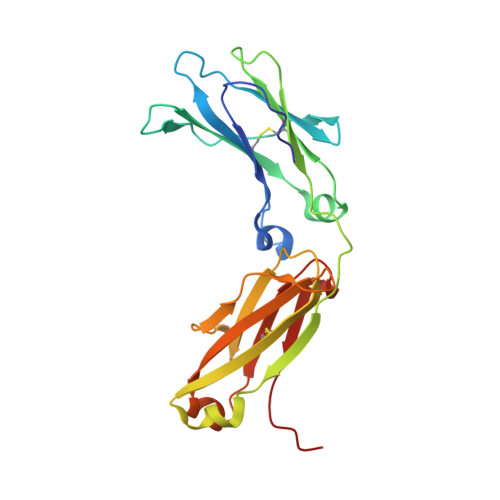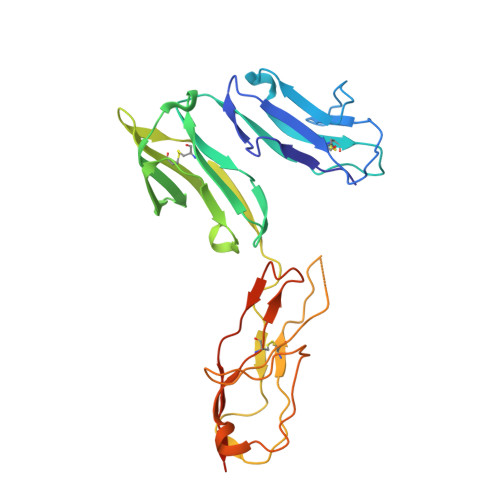Structure of Fc gamma RI in complex with Fc reveals the importance of glycan recognition for high-affinity IgG binding.
Lu, J., Chu, J., Zou, Z., Hamacher, N.B., Rixon, M.W., Sun, P.D.(2015) Proc Natl Acad Sci U S A 112: 833-838
- PubMed: 25561553
- DOI: https://doi.org/10.1073/pnas.1418812112
- Primary Citation of Related Structures:
4X4M - PubMed Abstract:
Fc gamma receptor I (Fc¦ÃRI) contributes to protective immunity against bacterial infections, but exacerbates certain autoimmune diseases. The sole high-affinity IgG receptor, Fc¦ÃRI plays a significant role in immunotherapy. To elucidate the molecular mechanism of its high-affinity IgG binding, we determined the crystal structure of the extracellular domains of human Fc¦ÃRI in complex with the Fc domain of human IgG1. Fc¦ÃRI binds to the Fc in a similar mode as the low-affinity Fc¦ÃRII and Fc¦ÃRIII receptors. In addition to many conserved contacts, Fc¦ÃRI forms additional hydrogen bonds and salt bridges with the lower hinge region of Fc. Unique to the high-affinity receptor-Fc complex, however, is the conformation of the receptor D2 domain FG loop, which enables a charged KHR motif to interact with proximal carbohydrate units of the Fc glycans. Both the length and the charge of the Fc¦ÃRI FG loop are well conserved among mammalian species. Ala and Glu mutations of the FG loop KHR residues showed significant contributions of His-174 and Arg-175 to antibody binding, and the loss of the FG loop-glycan interaction resulted in an ¡« 20- to 30-fold decrease in Fc¦ÃRI affinity to all three subclasses of IgGs. Furthermore, deglycosylation of IgG1 resulted in a 40-fold loss in Fc¦ÃRI binding, demonstrating involvement of the receptor FG loop in glycan recognition. These results highlight a unique glycan recognition in Fc¦ÃRI function and open potential therapeutic avenues based on antibody glycan engineering or small molecular glycan mimics to target Fc¦ÃRI for certain autoimmune diseases.
Organizational Affiliation:
Structural Immunology Section, Laboratory of Immunogenetics, National Institute of Allergy and Infectious Diseases, National Institutes of Health, Rockville, MD 20852 and.





















